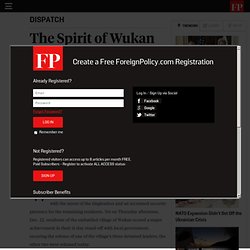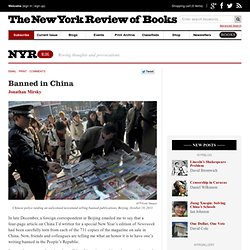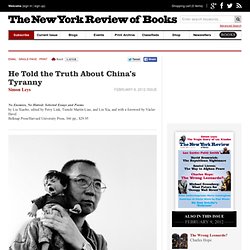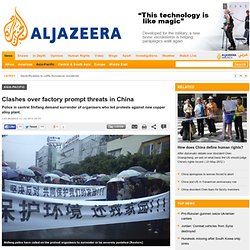

Wake Up and Smell the Jasmine - by Nicholas Bequelin. Ever since the Chinese Communist Party's near-death experience in 1989 -- the last time it faced anything close to the mass popular protests witnessed in recent weeks in the Middle East -- the rulers in Beijing have taken no chances when it comes to social movements.

So when an online appeal calling for Chinese citizens to emulate the revolutions in Tunisia and Egypt actually translated into gatherings of half-curious, half-prudent onlookers in Beijing and a handful of other cities two weeks ago, the authorities reacted swiftly. Several Internet users who had relayed the appeal on microblogs, such as Twitter, were arrested for "inciting subversion," a state security crime. Police rounded up, detained, or placed under house arrest more than 100 people nationwide. Three prominent lawyers who had been taken away by the police in Beijing on Feb. 16 and 19 have yet to reappear. Beijing didn't stop there. There is some truth to this counterargument.
PETER PARKS/AFP/Getty Images. The Spirit of Wukan - By Rachel Beitarie. WUKAN, China – Peasants do not have a good record facing off with the Communist Party.

Rural standoffs usually end with the arrest of the ringleaders and an increased security presence for the remaining residents. Yet on Thursday afternoon, Dec. 22, residents of the embattled village of Wukan scored a major achievement in their 11-day stand-off with local government, securing the release of one of the village's three detained leaders; the other two were released today. On Wednesday, a deputy party secretary of Guangdong Province arrived to negotiate with village leaders, promising to grant all of their initial demands: release of three elected representatives of Wukan who were detained two weeks ago; return of the body of Xue Jinbo, a village leader who died in police custody; and direct negotiations with the temporary committee, a interim governing body chosen by villagers, whose members were earlier denounced by the government as criminals.
Banned in China by Jonathan Mirsky. In late December, a foreign correspondent in Beijing emailed me to say that a four-page article on China I’d written for a special New Year’s edition of Newsweek had been carefully torn from each of the 731 copies of the magazine on sale in China.

Now, friends and colleagues are telling me what an honor it is to have one’s writing banned in the People’s Republic. In over forty years of writing about China, I have been subjected to many forms of pressure. But this has never happened to me. What had I said this time that attracted the attention of the official shredder? Then I learned that a few months earlier, on August 28, 2011, Ai Weiwei had also published a piece in Newsweek that the Chinese censors cut out. They see you or they don’t see you, it doesn’t make the slightest difference. Of course, as a Chinese citizen, Ai Weiwei risks another round of detention by saying such things. In so doing, however, the censors actually remind us how awful true censorship must be. He Told the Truth About China’s Tyranny by Simon Leys.
No Enemies, No Hatred: Selected Essays and Poems by Liu Xiaobo, edited by Perry Link, Tienchi Martin-Liao, and Liu Xia, and with a foreword by Václav Havel Belknap Press/Harvard University Press, 366 pp., $29.95 Better than the assent of the crowd: The dissent of one brave man!

—Sima Qian (145–90 BC)Records of the Grand Historian Truth will set you free. The economic rise of China now dominates the entire landscape of international affairs. All thinking people wish now to obtain at least some basic understanding of the deeper dynamics that underlie this sudden and stupendous metamorphosis: What are its true nature and significance? Clashes over factory prompt threats in China - Asia-Pacific. Chinese authorities have vowed to crack down on protesters in a central Sichuan province city after riot police clashed with hundreds of people rallying against a planned new metals plant.

In unusually strong language, Shifang city police warned citizens on Tuesday that they would be "severely punished" if they sought to continue the "illegal" protests over environmental concerns. The violence erupted on Monday when, according to the official account, protesters in the city of around 430,000 attacked government offices with bricks and stones, smashed cars, and clashed directly with police and government employees. The city government has said only 13 people were injured. "Anyone who has incited, planned or organised illegal gatherings, protest marches or demonstrations or those who have engaged in smashing and looting ... will be punished severely," the police said. 'Bloodied demonstrators' Hong Kong's Ming Pao newspaper reported that one high school student had died.